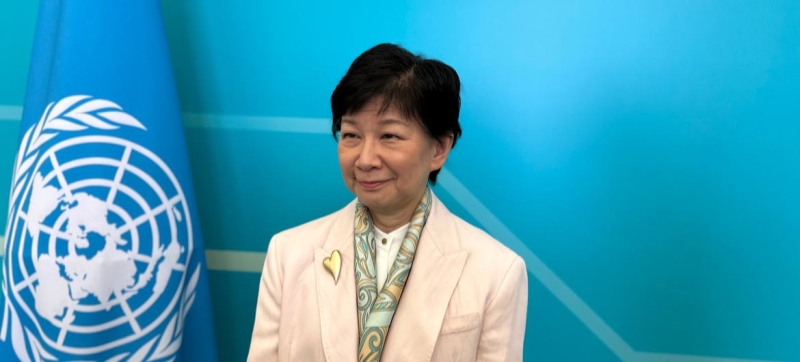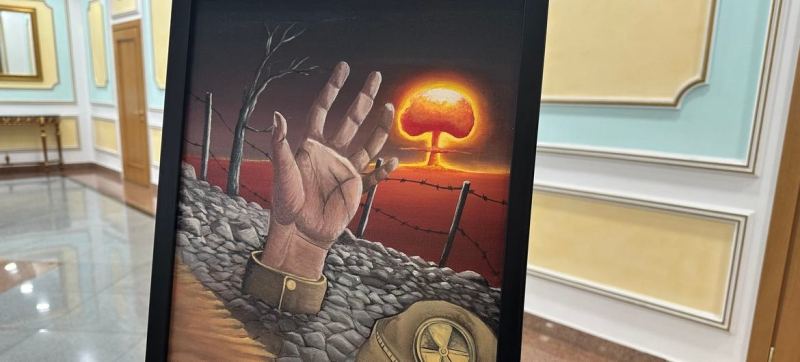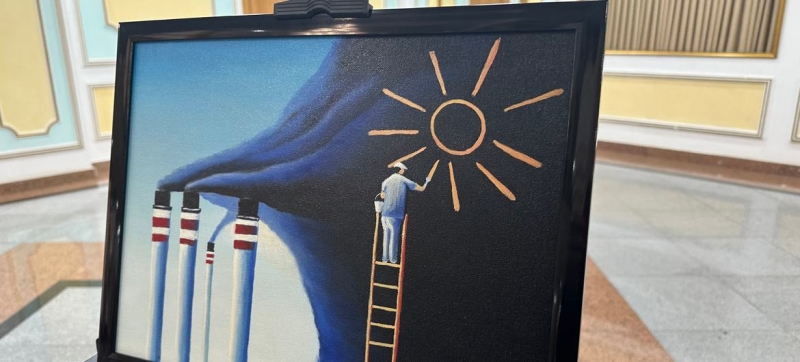
UN Secretary-General’s High Representative for Disarmament Affairs Izumi Nakamitsu. Izumi Nakamitsu at the Astana Forum: “The Prospects for the Use of Nuclear Weapons Today Are Unacceptably High” Kulpash Konyrova Peace and Security
An international conference on strengthening cooperation between nuclear-weapon-free zones opened in the capital of Kazakhstan on the eve of the International Day against Nuclear Tests, which is celebrated annually on August 29. UN High Representative for Disarmament Izumi Nakamitsu is taking part in the forum.
Nobody is forgotten and nothing is forgotten
“I was born in 1968 in the small village of Egindybulak, which was located a hundred kilometers from the Semipalatinsk nuclear test site. For 40 years, tests were carried out at the test site so that the Soviet Union would be a strong power, so that other countries would be afraid of it, but what a price we had to pay for it? Radiation destroyed people, wildlife, soil, water and even the future generation of children who had not yet had time to be born, as a result of which sick children were born,” this is how the Kazakh artist, who paints with his lips and feet, an activist of the international anti-nuclear movement, Karipbek Kuyukov, began his speech at an international conference in Astana. The two-day forum is attended by representatives of countries that are fighting for a world without nuclear weapons.

Painting by international anti-nuclear movement activist Karipbek Kuyukov.
Karipbek’s father often took him with him on trips to the city of Semey along the road that ran through the territory of the Semipalatinsk nuclear test site. In Soviet times, this place was classified, nuclear tests were conducted there. Between 1949 and 1984, 456 nuclear test explosions were carried out there.
“Then, driving through the steppe, I often saw this picture: young soldiers, saving themselves from the heat, were swimming in a lake that appeared on the site of a huge crater after another atomic bomb explosion and which was filled with groundwater. The locals called this place the “atomic lake,” ”Karipbek continued his story.
“I remember a lot of children who were born sick, at the sight of whom the midwives fainted. Animals were also born with anomalies… Thanks to the anti-nuclear movement “Nevada-Semipalatinsk”, which was headed by our famous Kazakh poet Olzhas Suleimenov, the whole world learned about this. And, as a creative person, I could not stay on the sidelines and with the help of my paintings began to fight against nuclear weapons,” he added.
The artist called on the conference participants to protect the world from the new danger posed by the wars that have broken out in recent years in different parts of the world.

Painting by the activist of the international anti-nuclear movement Karipbek Kuyukov.
Nuclear-Free Zones – Islands of Hope
The forum was opened by First Deputy Foreign Minister of Kazakhstan Akan Rakhmetullin, who last month chaired the second session of the Preparatory Committee for the Review Conference of the Parties to the Treaty on the Non-Proliferation of Nuclear Weapons. In his speech, he called the current geopolitical confrontation and the ongoing erosion of international norms “unprecedented.”
“Today’s meeting in Astana should help strengthen trust between countries. The creation of nuclear-weapon-free zones is a very strong and powerful tool for reviving trust and hope for a safe world in the future,” Rakhmetullin said.
His words about the unprecedented aggravation of the current situation in the world were supported by the High Representative of the UN Secretary-General for Disarmament Affairs Izumi Nakamitsu.
“Everyone understands that the prospects of nuclear weapons being used, whether intentionally, by mistake or miscalculation, have become unacceptably high. One wrong move could plunge us into the abyss,” Nakamitsu said.
She stressed that nuclear weapons must never be used again. “Any rhetoric about the potential use of nuclear weapons is unacceptable. We must protect the law on the inadmissibility of the use of such weapons,” Nakamitsu emphasized.
The UN, according to her, also notes positive trends: in the context of the intensified geopolitical confrontation in the world, interest in strengthening existing and creating new nuclear-weapon-free zones has increased.
“Efforts to create zones in such diverse regions as the Arctic, Northeast Asia and Central Europe should be encouraged. “A new zone in the Middle East must remain a priority,” the UN spokeswoman said.
She added that the conflict in Gaza and the risk of its expansion underscore the urgency and importance of creating a nuclear-weapon-free zone in the Middle East.
“What is needed today is for nuclear-weapon states to take the initiative and engage in dialogue to see what they can do in this direction,” Nakamitsu said.
She recalled that in 2006, Central Asia was the zone where nuclear non-proliferation talks were last held. “We cannot allow it to be the last one,” Nakamitsu emphasized.
The Treaty on a Nuclear-Weapon-Free Zone in Central Asia, concluded in 2006, was signed in Semipalatinsk by five Central Asian states. Hence the unofficial name of the document – the “Semipalatinsk Treaty.”
Read also:
INTERVIEW | Nuclear disarmament: geopolitical differences ‘pull countries apart’
The treaty has a number of unique features. It is the first of its kind in the Northern Hemisphere, with two nuclear-weapon states on either side of the zone it creates. The treaty also includes an environmental component to address the overall problem of widespread environmental damage caused by nuclear testing.
The Protocol to the Semipalatinsk Treaty was signed by five nuclear powers – China, France, Russia, the United Kingdom, and the United States. It has so far been ratified by the United Kingdom, China, Russia, and France. Kazakhstan continues consultations with the United States on this issue.
“We hope that a positive solution to this issue will be found in the very near future,” Akan Rakhmetullin noted.
Kazakhstan’s Contribution
The UN Secretary-General’s High Representative for Disarmament Affairs Izumi Nakamitsu, speaking to journalists on the sidelines of the conference, noted Kazakhstan’s role in non-proliferation. “Kazakhstan, which has experienced and continues to suffer the consequences of nuclear weapons testing, voluntarily renounced them. The country takes an active position on this issue not only in Central Asia, but can also work at the global level, since this country has great authority and trust in matters related to nuclear disarmament,” the UN representative emphasized.
30 years ago, Kazakhstan joined the Treaty on the Non-Proliferation of Nuclear Weapons (NPT), having previously closed the Semipalatinsk nuclear test site and renounced the Soviet nuclear legacy on its territory. The civil society movement known as Nevada-Semipalatinsk played an important role in making these decisions and in shaping the country’s strong commitment to nuclear disarmament.
“Kazakhstan’s actions also set in motion other landmark processes, such as the adoption of the Comprehensive Nuclear-Test-Ban Treaty (CTBT) and the UN General Assembly’s decision to proclaim August 29 as the International Day against Nuclear Tests,” Akan Rakhmetullin recalled.
Last year, Kazakhstan introduced a historic resolution “On Victim Assistance and Environmental Restoration in States Affected by the Use or Testing of Nuclear Weapons.” Kazakhstan has begun discussions on the establishment of an International Trust Fund to provide assistance to victims and restore the environment after nuclear tests.
